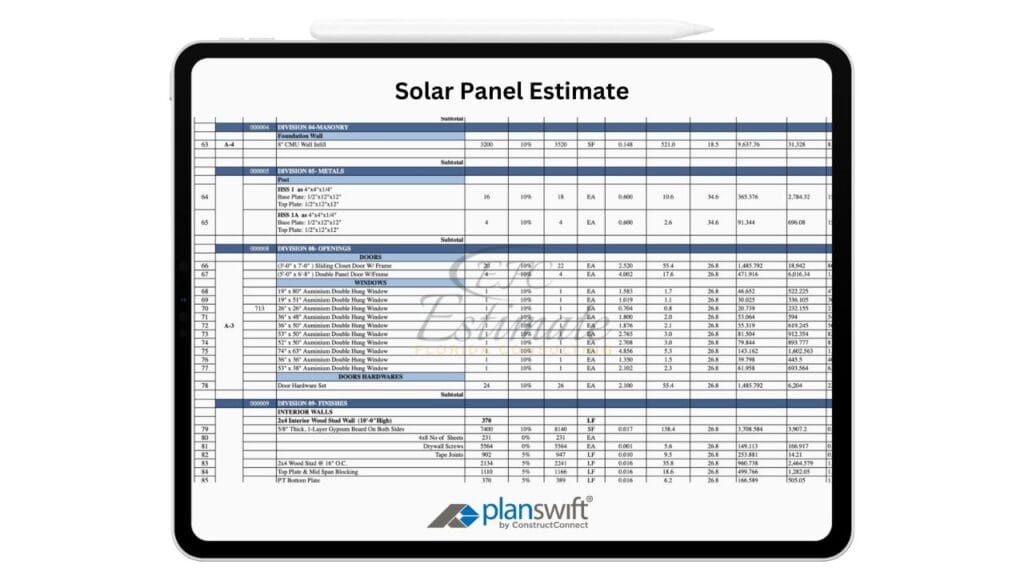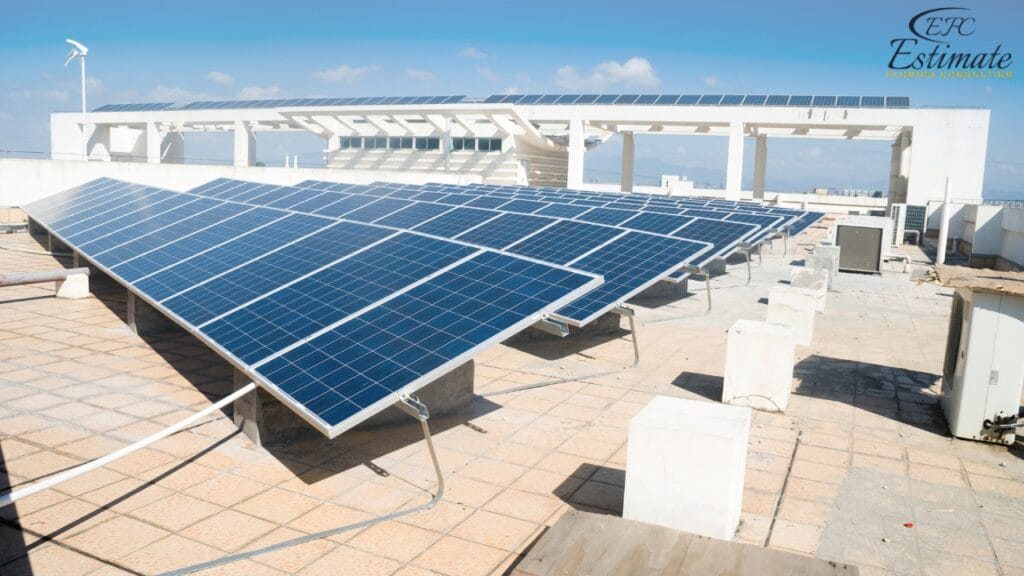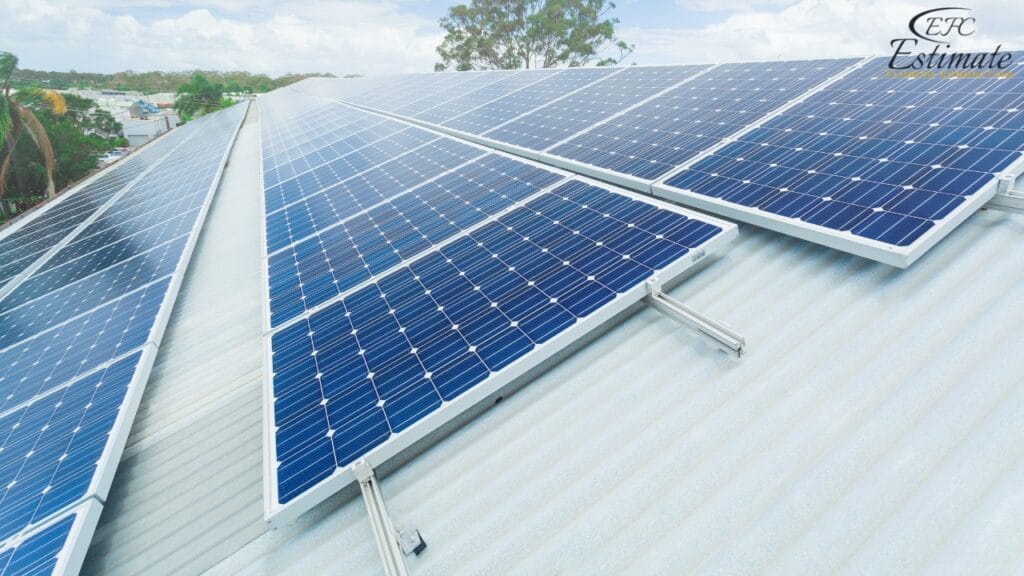90% More Chances to Win Projects With Our Estimate!
- Multi-Family Building
- Hotel Building
- Hospital Building
- Warehouse Building
- School & University Building
- High-Rise Building
- Shopping Complex
- Data Center Building

Solar panels are rapidly becoming an attractive option for homeowners who wish to lower their electricity bills while making a positive impact on the environment. The pivotal question many homeowners find themselves grappling with is: how much does it cost to get solar panels on your roof? This comprehensive guide is designed to delve into the various costs associated with solar panel installation and provide a nuanced understanding that can help contractors, subcontractors, homeowners, developers, and construction professionals navigate this dynamic market.

A thorough understanding of the costs associated with solar panel installation helps homeowners and contractors make informed financial decisions. Below is a detailed breakdown of the various costs involved, including potential additional expenses that may arise.
In Florida, the average cost of solar panels ranges from $3.00 to $4.20 per watt installed. This cost encompasses panels, inverters, labor, and other related expenses. For most residential installations, homeowners can expect the following average costs:
System Size (kW) | Average Cost per Watt | Total Installation Cost |
5 kW | $3.60 | $18,000 |
7 kW | $3.42 | $23,940 |
10 kW | $3.24 | $32,400 |
Installation costs typically represent 10% to 30% of the total project cost. Below are estimated installation costs based on system size:
System Size (kW) | Installation Cost (Low) | Installation Cost (High) |
5 kW | $1,500 | $3,000 |
7 kW | $2,100 | $4,200 |
10 kW | $3,000 | $6,000 |
In addition to basic installation and equipment costs, homeowners should also account for other potential expenses, including:
Additional Costs | Estimated Range |
Permitting Fees | $100 – $500 |
Inspection Fees | $200 – $500 |
Utility Connection Fees | $300 – $600 |
Florida homeowners can take advantage of various incentives and rebates that can significantly reduce overall costs. These may include:
State Incentives: Florida offers additional incentives, including property tax exemptions for solar installations, which can further enhance the financial feasibility of going solar.
A nuanced understanding of the various factors that influence solar panel installation costs can significantly aid homeowners and contractors in accurately estimating expenses and making well-informed decisions. Here, we outline the primary elements that can affect overall costs.
The size of the solar panel system is one of the most significant factors affecting installation costs. Larger systems can produce more electricity but typically come with higher upfront costs. A typical residential solar system usually ranges from 5 kW to 10 kW, with the most common size being around 6 kW. The cost per watt generally decreases as the system size increases, making larger installations more cost-effective in the long run.
For instance, a 5 kW system may cost around $15,000, while a 10 kW system could cost approximately $30,000. Here’s a breakdown of average costs based on system size:
System Size (kW) | Total Cost (Low) | Total Cost (High) |
5 kW | $15,000 | $21,000 |
7 kW | $21,000 | $29,400 |
10 kW | $30,000 | $42,000 |
The type of solar panels selected for installation also plays a crucial role in determining overall costs. There are three primary types:
Selecting the right panel type involves careful consideration of upfront costs versus long-term energy production, helping homeowners find a balance that suits their financial and energy needs.
The complexity of the installation can vary widely based on several factors, including the roof’s pitch, layout, and orientation. Roofs with steep pitches or intricate designs may require additional labor, resulting in higher installation costs. If structural modifications or reinforcements are necessary, this can further increase the overall expense.
The existing condition and type of roofing material can significantly influence installation costs. Certain roofing materials, such as tile or slate, may necessitate specialized installation techniques, which can drive up labor costs. Additionally, if the roof requires repairs or replacements before the solar panels can be installed, homeowners should be prepared to budget for these additional costs.

The costs for solar panel installation can vary dramatically across Florida due to differences in labor rates, local incentives, and market demand. For instance, urban areas such as Miami and Orlando may have higher labor costs due to increased demand for solar installations, while more rural areas might benefit from lower installation fees. Understanding local market conditions is crucial for accurate cost estimation and budgeting.
Solar panels are engineered to capture sunlight and convert it into usable electricity, offering a sustainable energy source with an array of benefits. Here are some of the most compelling advantages of installing solar panels on your roof:

The upfront costs associated with solar panel installation can be substantial, but there are several financing options available to help homeowners manage these expenses effectively.
Homeowners can choose to purchase solar panels outright, allowing them to benefit from the federal tax credit and avoid any long-term financial commitments. This option requires a significant upfront investment but leads to the greatest long-term savings on energy bills.
Solar leases and PPAs allow homeowners to install solar panels without the upfront costs. Under a lease agreement, homeowners pay a fixed monthly fee for using the solar system. In a PPA, they pay a set rate for the electricity generated by the panels. While these options reduce initial costs, they may not offer the same level of long-term savings as outright purchases.
Many financial institutions and solar companies offer specialized loans to help homeowners finance their solar panel systems. These loans often come with low-interest rates and flexible repayment terms, making them an attractive option for many homeowners.
Selecting a reputable solar contractor is crucial for ensuring a smooth installation process and optimal performance of the solar system. Here are several key considerations to keep in mind when choosing a contractor.
Ensure that the solar contractor holds the necessary licenses and certifications to operate in Florida. This may include specific solar installer licenses and certifications from organizations like the North American Board of Certified Energy Practitioners (NABCEP). Proper licensing is essential for compliance with local regulations and industry standards.
Research the contractor’s experience and seek references from previous clients. Experienced contractors are more likely to handle potential challenges effectively and ensure high-quality installation. Requesting customer testimonials can also provide valuable insights into their reliability and service quality.
Inquire about the warranties offered for both the solar panels and the installation. Most reputable contractors provide warranties covering equipment for 25 years and installation for at least 5 to 10 years. Additionally, assess the level of ongoing support and maintenance services they offer post-installation.
Understanding the solar installation process can help homeowners prepare and set realistic expectations for the timeline and tasks involved. Below is a step-by-step overview of the typical process.
During the initial consultation, homeowners discuss their energy needs, budget, and potential solar solutions with the contractor. The contractor may conduct a preliminary assessment of the home and roof to determine suitability for solar installation.
Following the initial consultation, the contractor will conduct a detailed site assessment. This may involve evaluating the roof’s orientation, pitch, shading from nearby trees, and overall condition. The contractor will also assess the existing electrical system to ensure compatibility with the solar installation.
Once the design and system specifications are finalized, the contractor will handle the necessary permits and approvals required by local authorities. This step is critical for ensuring compliance with local codes and regulations.
Installation typically takes 1 to 3 days, depending on the system size and complexity. The contractor will install the solar panels, inverter, and other necessary components. Safety measures and adherence to industry standards are paramount during this stage.
After installation, a final inspection will be conducted by local authorities to verify compliance with regulations. Once approved, the system can be activated, and homeowners can begin generating their own electricity.
Understanding the ongoing maintenance requirements and potential long-term costs associated with solar panels can help homeowners prepare for the future.
Solar panels generally require minimal maintenance, but periodic inspections are essential to ensure optimal performance. Homeowners should clean the panels to remove dirt and debris, which can impede efficiency. Most experts recommend an annual professional inspection to assess system performance and identify any potential issues.
In the event of equipment failure or damage, repair costs can vary based on the specific components involved. Typical repair costs may range from $200 to $600 for minor repairs, while significant issues may necessitate equipment replacement or major repairs, potentially costing $1,000 to $2,500.

Solar energy is not only a cost-effective solution for homeowners but also plays a crucial role in promoting environmental sustainability. Here are some key environmental benefits of solar energy:

As the demand for renewable energy sources continues to rise, solar panels have emerged as a viable and financially sound option for homeowners in Florida. While the upfront costs of installation may seem daunting, understanding the various factors that influence these costs, as well as the potential savings and environmental benefits, can empower homeowners to make informed decisions. By selecting reputable contractors and exploring financing options, individuals can effectively navigate the transition to solar energy, ensuring they maximize their investment and contribute to a sustainable future.
Savings vary based on energy consumption and system size, but many homeowners report savings of 50% to 90% on their monthly energy bills.
Most solar panels are designed to last 25 years or more, with many manufacturers offering warranties covering this period.
Yes, homeowners can take advantage of the federal solar tax credit, which currently allows a 26% tax credit on the total installation cost.
Solar panels require minimal maintenance, but homeowners should schedule annual inspections and clean the panels to ensure optimal performance.
Yes, solar panels can be installed on flat roofs using specialized mounting systems designed to optimize angle and sunlight exposure.
At Estimate Florida Consulting, we offer detailed cost estimates across all major trades, ensuring no part of your project is overlooked. From the foundation to the finishing touches, our trade-specific estimates provide you with a complete and accurate breakdown of costs for any type of construction project.

We take pride in delivering accurate, timely, and reliable estimates that help contractors and builders win more projects. Our clients consistently praise our attention to detail, fast turnaround times, and the positive impact our estimates have on their businesses.
Estimate Florida Consulting has helped us win more bids with their fast and accurate estimates. We trust them for every project!

Submit your project plans, blueprints, or relevant documents through our online form or via email.
We’ll review your project details and send you a quote based on your scope and requirements.
Confirm the details and finalize any adjustments to ensure the estimate meets your project needs.
Receive your detailed, trade-specific estimate within 1-2 business days, ready for your project execution.

561-530-2845
info@estimatorflorida.com
Address
5245 Wiles Rd Apt 3-102 St. Pete Beach, FL 33073 United States
561-530-2845
info@estimatorflorida.com
Address
5245 Wiles Rd Apt 3-102 St. Pete Beach, FL 33073 United States
All copyright © Reserved | Designed By V Marketing Media | Disclaimer